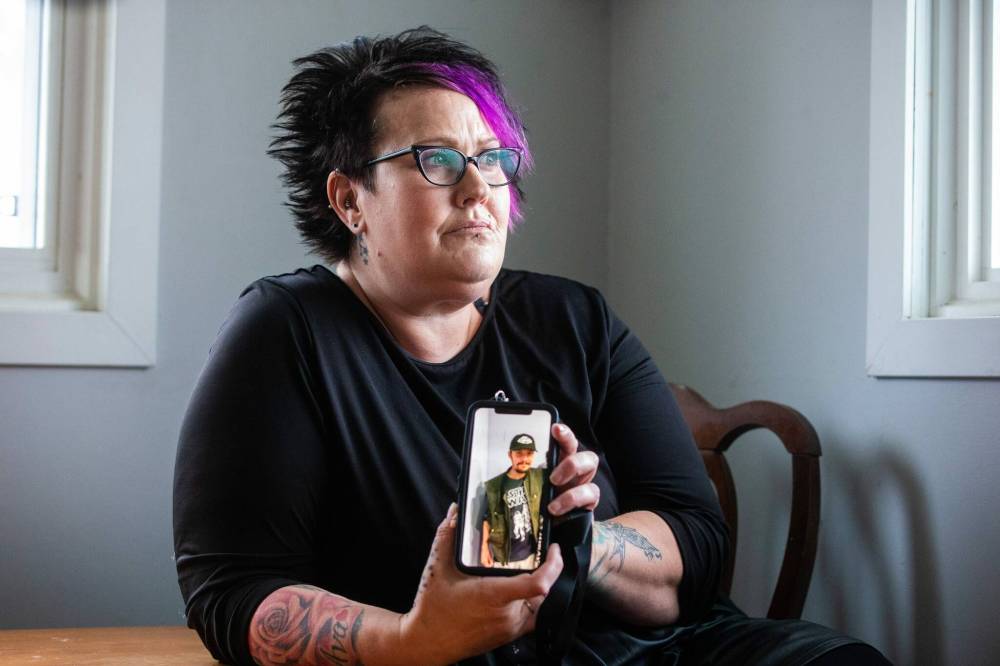‘This kid is ready to get off drugs’
Mom desperately hopes NDP makes good on addiction-treatment promises
Advertisement
Read this article for free:
or
Already have an account? Log in here »
To continue reading, please subscribe:
Monthly Digital Subscription
$0 for the first 4 weeks*
- Enjoy unlimited reading on winnipegfreepress.com
- Read the E-Edition, our digital replica newspaper
- Access News Break, our award-winning app
- Play interactive puzzles
*No charge for 4 weeks then price increases to the regular rate of $19.00 plus GST every four weeks. Offer available to new and qualified returning subscribers only. Cancel any time.
Monthly Digital Subscription
$4.75/week*
- Enjoy unlimited reading on winnipegfreepress.com
- Read the E-Edition, our digital replica newspaper
- Access News Break, our award-winning app
- Play interactive puzzles
*Billed as $19 plus GST every four weeks. Cancel any time.
To continue reading, please subscribe:
Add Free Press access to your Brandon Sun subscription for only an additional
$1 for the first 4 weeks*
*Your next subscription payment will increase by $1.00 and you will be charged $16.99 plus GST for four weeks. After four weeks, your payment will increase to $23.99 plus GST every four weeks.
Read unlimited articles for free today:
or
Already have an account? Log in here »
Hey there, time traveller!
This article was published 26/10/2023 (776 days ago), so information in it may no longer be current.
Winnipeg mother Tricia Grainger hopes her son will finally get the addictions treatment he desperately needs after the new Manitoba government promised big changes to health care Tuesday.
Grainger’s son, 28-year-old Austin Grainger, has been addicted to meth and living on the streets for the past five years. He’s now on a journey to get clean, and is currently in the final stage of a 10-day stay in Main Street Project’s men’s withdrawal management facility.
It’s the second time in the past two months he has been in a short-term detox bed, and after his first visit in September, there was nowhere for him to go but back on the street.

MIKAELA MACKENZIE / WINNIPEG FREE PRESS
Through her son, Tricia Grainger has seen how the lack of options can undo the detox achievements of people who want to get clean.
This time, Grainger tried to find him a bed at a long-term treatment centre but every publicly funded space was full. When her son leaves the Main Street Project Thursday, he will be going home with his mother.
“This kid is ready to get off drugs and no one will help him,” she said.
After short-term detox, there is a range of treatment programs available in Manitoba, including those offered through the Behavioural Health Foundation and the Addictions Foundation of Manitoba. But bridging the gap between wanting to get help and actually getting into treatment has been impossible for Grainger and her son, and she knows from experience even a brief time back on the street after an attempt at getting sober can be dangerous.
“My major concern is these people are going to detox to try and straighten out their life, and then they get released with nowhere to go, no followup, no medication to help with their mental health,” she said.
Grainger struggled to hold back tears while thinking about the steps her son has taken, including pursuing anti-psychotic medication for mental-health issues and seeking a second round of detox.
She’s worried it could be all for nothing.
“I feel like I’ve mourned my son for years when he was on the streets. Once he got on medication, and was ready to do this, I got him back,” she said.
“He’s a great man. He’s funny and he’s smart and he’s willing; he’s doing whatever they ask of him, but they just keep letting him down.”
She’s not the only one watching the newly elected NDP government, which has promised to usher in a safe-consumption site in Winnipeg and hire 100 more mental-health workers to focus on connecting people to wrap-around supports and housing.
During a Tuesday news conference focused on retaining health-care workers, Health Minister Uzoma Asagwara said addictions treatment is high on the government’s priority list.
“Harm reduction is health care, and our government is committed to ensuring harm reduction is treated as health care across our province,” Asagwara said.
Trevor Aikman, Main Street Project’s manager of withdrawal management services, hopes to see a consistent conversation between front-line organizations and the province in the coming months.
“I think the biggest thing is listening to the feedback that a lot of different services are providing right now, and putting those feelers out there,” he said.
There are 21 beds at Main Street Project’s men’s treatment facility on Martha Street and 27 beds for women at its Magnus Avenue location, save for two set aside for transgender or gender-fluid clients. Most stays are about 14 days in length, but can vary depending on the individual’s progress.
Moving clients from detox beds to treatment or other resources is a complicated process that requires more investment, ranging from more accessible housing to improvements in employment and income assistance.
“When it comes to treatment beds, I think we’re hopeful with the new government that we’re going to see, possibly, an expansion of that,” said Aikman.
“We’re definitely all feeling the bed-space issue at this point, and then the inter-operability amongst different programs that do different things.”
At Moms Stop the Harm, an activist organization and network of families impacted by addiction, Grainger’s story is one that has been told countless times, said Arlene Last-Kolb, an organizer who lost a son to a drug overdose.
“That happened to our son, Jesse, when he overdosed in the hospital. He was promised the world and nothing happened,” she said. “We know that people would be alive if they actually got the help that they are asking for.”
Families in Manitoba have been asked to “accept the unacceptable” and she has seen people die while waiting for the long-term treatment they need, Last-Kolb said.
While she is cautiously optimistic the new provincial government will invest in long-term treatment that bridges that gap, she knows there are people such as the Graingers who need that change immediately.
“Her son is here at the cusp of change,” she said. “Will he make it? I don’t know.”
malak.abas@freepress.mb.ca

Malak Abas is a city reporter at the Free Press. Born and raised in Winnipeg’s North End, she led the campus paper at the University of Manitoba before joining the Free Press in 2020. Read more about Malak.
Every piece of reporting Malak produces is reviewed by an editing team before it is posted online or published in print — part of the Free Press‘s tradition, since 1872, of producing reliable independent journalism. Read more about Free Press’s history and mandate, and learn how our newsroom operates.
Our newsroom depends on a growing audience of readers to power our journalism. If you are not a paid reader, please consider becoming a subscriber.
Our newsroom depends on its audience of readers to power our journalism. Thank you for your support.




